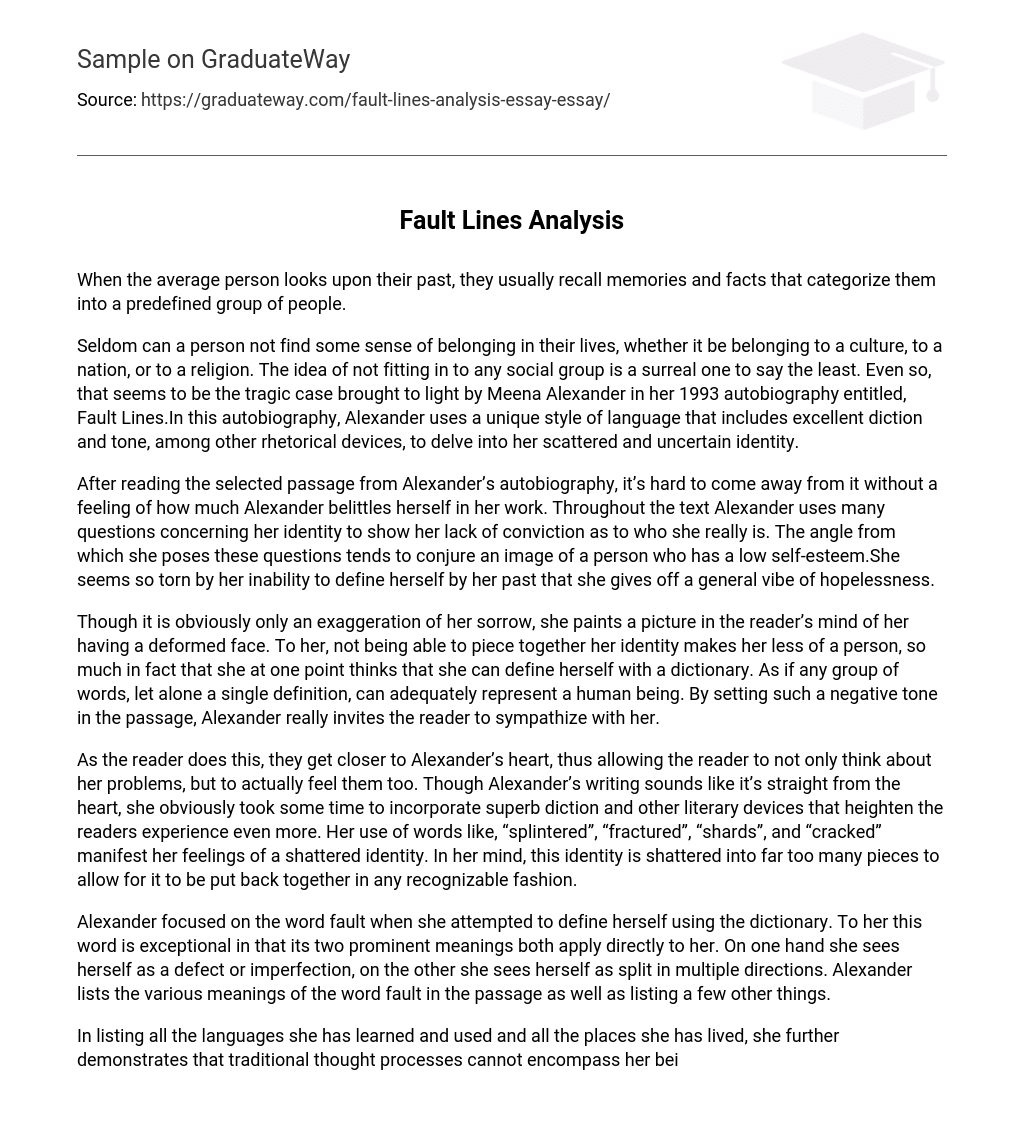People frequently classify themselves by recalling memories and specific details from their past.
Meena Alexander explores the uncommon experience of not feeling a sense of belonging in her life, which can stem from various factors such as culture, nationality, or religion. This concept of not fitting in with any social group is quite peculiar. However, Alexander brings attention to this unfortunate circumstance in her autobiography Fault Lines published in 1993. Throughout her memoir, she employs a distinct language style characterized by remarkable word selection and tone alongside other rhetorical techniques to delve into her fragmented and uncertain sense of self.
Despite the various questions and ponderings raised by Alexander in her autobiography, it is evident that she consistently undermines her own value and importance. Her extensive exploration of personal identity reveals a lack of confidence and certainty in her true self. The manner in which she presents these inquiries suggests a low self-esteem, as she struggles to establish a sense of her own worth through her past experiences. Ultimately, her pervasive sense of hopelessness permeates the text.
While an exaggeration, the protagonist’s distorted face symbolizes her profound sorrow. She believes that her lack of identity diminishes her value as a person, to the point where she considers defining herself solely through a dictionary. However, this idea is unrealistic as no set of words or single definition can fully capture the complexity of a human being. By creating this pessimistic atmosphere, Alexander successfully evokes sympathy from the reader.
By immersing themselves in the text, readers can empathize with Alexander’s struggles on a deeper level and truly understand her emotions. Although her writing feels personal and heartfelt, Alexander skillfully incorporates powerful word choices and literary devices to intensify the reader’s experience. Words such as “splintered,” “fractured,” “shards,” and “cracked” vividly convey her sense of having a fragmented identity. According to her perspective, this shattered self cannot be reconstructed in a coherent manner.
While attempting to define herself using the dictionary, Alexander became fixated on the term “fault.” She noticed that this word carries two significant meanings that are relevant to her personal identity. Firstly, she perceives herself as a flaw or imperfection. Secondly, she views herself as divided in multiple aspects. In addition to exploring the various interpretations of the word fault, Alexander briefly touches upon other subjects.
The text highlights the inability of traditional thought processes to comprehend the person’s diverse experiences. The author’s extensive list of languages learned and places lived acts as evidence to the overwhelming amount of background information in her mind that she struggles to integrate into her identity. It is suggested that perhaps her past is too intricate for her to make sense of it in a socially acceptable manner. Despite Alexander’s portrayal of being isolated in her fractured identity, there are likely many others who share her predicament. It is clear that Alexander’s identity struggles are significant and should be acknowledged accordingly.
It is intriguing to question what influenced and formed her pessimistic perspective. The reader is aware of pleasant memories in Alexander’s thoughts, memories unmarred by emotions of being out of place and segregated, joyful memories. Could it be that these memories are solely from a period before Alexander pondered a fragmented sense of self, or is there crucial information missing for the reader? Nonetheless, one cannot deny that Alexander’s writing style prompts deep contemplation and offers the reader valuable understanding on topics rarely addressed in everyday life.





